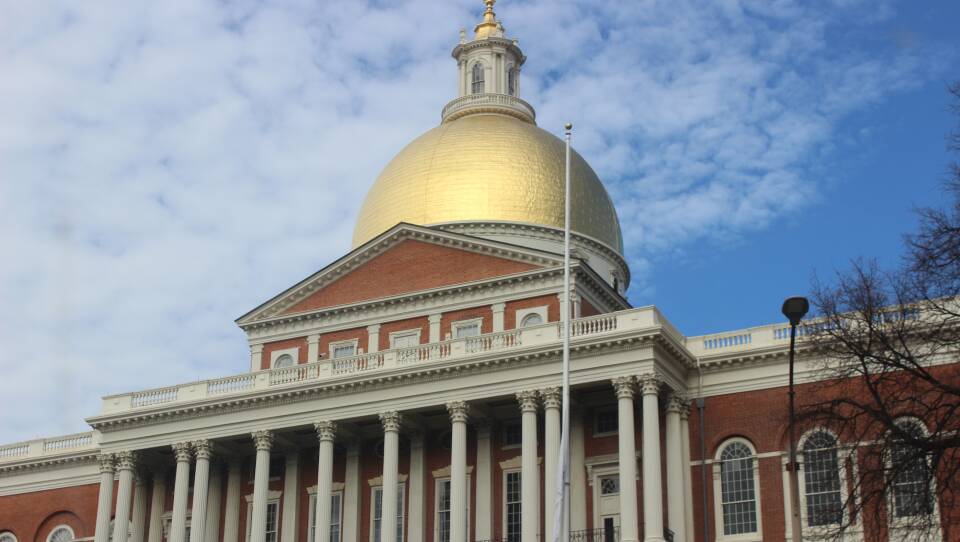House and Senate Democrats said Thursday they agreed to a deal on a long-overdue spending bill after their weeks of inaction fueled a political maelstrom.
Ways and Means Committee Chairs Rep. Aaron Michlewitz and Sen. Michael Rodrigues announced just after 10:30 a.m. they "reached an agreement on the supplemental budget to close the books on Fiscal Year 2023," which ended June 30.
As has become their custom when announcing agreements, they did not provide any details about what the compromise bill will include or whether it will feature the $250 million both branches initially approved for the emergency shelter system, which drew opposition from Republicans who pushed unsuccessfully to reform the state's response to an influx of migrants.
The Massachusetts Taxpayers Foundation reported Wednesday that 99 percent of the spending in the two nearly $3 billion bills overlaps.
"On behalf of our fellow conferees, we’re pleased to announce that we’ve reached an agreement on the supplemental budget to close the books on Fiscal Year 2023," Michlewitz and Rodrigues said. "Our respective staffs are actively working to finalize remaining details and complete the work required to file a Conference Committee report. We anticipate a report being filed in the coming hours to ensure that the House and Senate can act on the report promptly and send it to the Governor.”
Although each branch appointed three members to a conference committee once informal talks failed to achieve consensus on Nov. 15, the final day for formal sessions, the panel seemingly still had not met as of Wednesday.
Because Democrats did not complete a deal before formal sessions ended for the year, Republicans now wield the power to block passage of the final bill with a single objection. House Republicans boldly declared Wednesday they would "strongly oppose" efforts to approve the bill "in its entirety in an informal session, minus any meaningful policy reforms."
"The fact that the Speaker, Senate President and Governor have been unable to reach consensus on the migrant issue shows that this is too contentious an issue to take up in an informal session," House Minority Leader Brad Jones said Wednesday. "The House Republican Caucus believes this spending bill should receive a roll call vote in a full formal session, and not be passed in a sparsely attended informal session. The hard-working men and women who have been waiting months for their collectively bargained pay raises continue to show up for work, and the members of the House and Senate should be prepared to do the same and reconvene in a full formal session."
The House and Senate are both scheduled to begin informal sessions Thursday at 11 a.m. where Democrats appear poised to try to muscle the compromise through and Republican promises to force a vote in formal sessions will be put to the test.
In addition to the high-profile shelter funding, the roughly $2.8 billion spending bills each branch approved included money to pay for collectively bargained raises for tens of thousands of state employees, scheduled the next state primary on Sept. 3, 2024, and cleared the way to renegotiate contracts for a clean hydropower transmission project.
Lawmakers are scheduled to begin fiscal 2025 budget discussions on Monday. The pending bill, if passed, will close the fiscal 2023 books.
House and Senate Democrats failed to complete a deal despite working past midnight on the final night of formal sessions for the year. Right before they gaveled out, they punted the topic into a six-member conference committee to continue talks.
But in the two-plus weeks since then, the conference committee never even met, according to Sen. Patrick O'Connor of Weymouth, one of two Republicans on the panel. O'Connor voted against the Senate version of the bill, and he did not say Thursday if he supports or opposes the compromise Democrats struck.
Around 11:45 a.m., O'Connor told reporters he was still "waiting to get fully briefed on all the particulars" of the compromise that Michlewitz and Rodrigues had announced more than an hour earlier. He deferred questions about specifics, including where the final bill lands on emergency shelter funding and migrant policy, to the two Democrats.
"I was briefed yesterday on some of the specifics, but I defer to them just because those conversations were verbal and I don't have the document in front of me," he said.
[Michael Norton and Alison Kuznitz contributed reporting.]
This is a developing story.




